Search the Special Collections and Archives Portal
Search Results

Letter from [A. M. Folger] to Hugh A. Shamberger (Carson City), August 23, 1948
Date
1948-08-23
Archival Collection
Description
Request to the state engineer to expedite their permit to drill a well since the period for people to object had expired.
Text
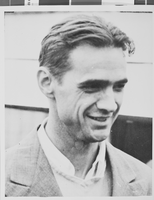
Photograph of Howard Hughes, July 7, 1939
Date
1939-07-07
Archival Collection
Description
Description given with photograph: "Howard Hughes pleased with new Stratoliner."
Image
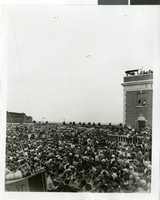
Photograph of a crowd of people awaiting the arrival of Howard Hughes, New York, July 14, 1938
Date
1938-07-14
Archival Collection
Description
The black and white view of a crowd of people awaiting the arrival of Howard Hughes in his Lockheed 14 aircraft at Floyd Bennett Airport, New York. This final landing for Hughes marked the end of his Round The World flight.
Image
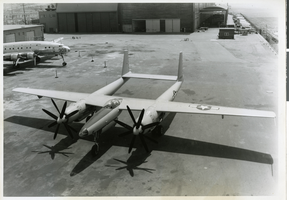
Photograph of the XF-11 prior to its first test flight in Culver City, California July 7, 1947
Date
1947
Archival Collection
Description
Transcribed from press release attached to back of photo: "NEW-DESIGN PHOTO PLANE COMPLETED CULVER CITY, Calif., July 7 -- test-flown today for the first time, the new XF-11 was revealed as one of the world's fastest long-range photographic planes. It was designed and built by Howard Hughes in conjunction with the Air Materiel command engineers. Army officials said that it can attain a speed of more than 400 miles per hour and a ceiling of more than 40,000 feet. The plane has a pressurized cabin making it unnecessary for the crew to use oxygen masks. Outstanding features include a full-span flap, unique eight-camera layout and exceptionally fast take-off." Transcribed from photo sleeve: "Howard Hughes sits in the cockpit of the XF-11, a reconnaissance plane that Hughes built and designed in conjunction with Air Materiel Command engineers. Hughes is preparing for his first test flight in Culver City, California July 7, 1947."
Image
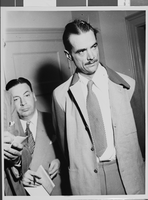
Photograph of Howard Hughes with Senator Harry P. Cain, Culver City, California, August 16, 1947
Date
1947-08-16
Archival Collection
Description
A view of Howard Hughes (right) after being asked about his controversial XF-11 photo reconnaissance plane by Senator Harry Cain (left), Republican of Washington, in Culver City, California.
Image
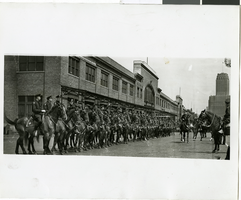
Photograph of police men awaiting the arrival of Howard Hughes, New York, July 15, 1938
Date
1938-07-15
Archival Collection
Description
Typed onto a piece of paper attached to the image: "Police lined up ready for the start of Howard Hughes parade. 7/15/38."
Image
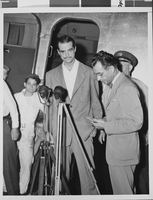
Photograph of Howard Hughes, New York, New York, September 12, 1946
Date
1946-09-12
Archival Collection
Description
A view of Howard Hughes saying a few words for a radio audience just after arriving in New York, New York.
Image
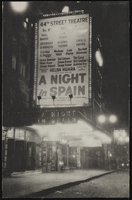
The marquee of the 44th Street Theatre, New York City: photographic print
Date
1890 (year approximate) to 1980 (year approximate)
Archival Collection
Description
The marquee of the 44th Street Theatre, New York City. Grace Hayes' name is on the marquee for the show "A Night in Spain."
Image

Photograph of the landing of Howard Hughes' Lockheed 14 aircraft, New York, July 14, 1938
Date
1938-07-14
Archival Collection
Description
The black and white view of Howard Hughes' Lockheed 14 aircraft performing its final landing on the Round the World flight at Floyd Bennett Airport, New York. Typed onto a piece of paper attached to the image: "Howard Hughes lands at Floyd Bennett Field. 7/38."
Image
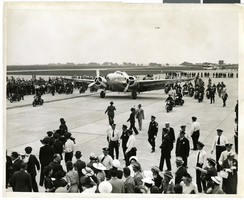
Photograph of the landing of Howard Hughes' Lockheed 14 aircraft, New York, July 14, 1938
Date
1938-07-14
Archival Collection
Description
The black and white view of Howard Hughes' Lockheed 14 aircraft performing its final landing on the Round the World flight at Floyd Bennett Airport, New York.
Image
Pagination
Refine my results
Content Type
Creator or Contributor
Subject
Archival Collection
Digital Project
Resource Type
Year
Material Type
Place
Language
Records Classification
